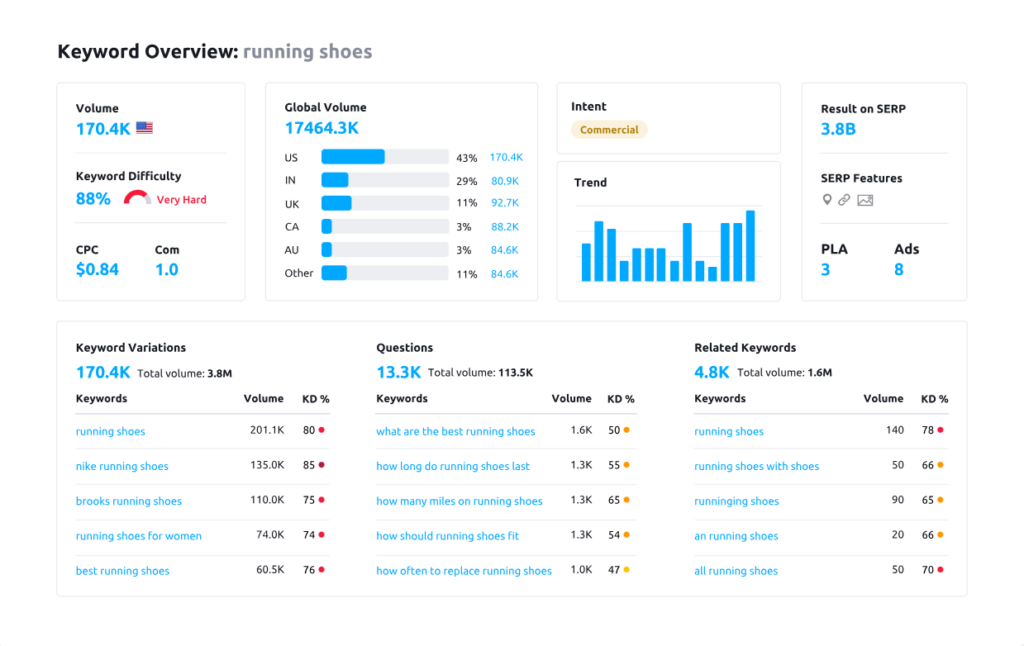Understanding ecommerce SEO keywords is crucial for any online store aiming to enhance its visibility and attract more customers. Effective keyword research serves as the foundation for your SEO strategy, helping you target the right audience and drive relevant traffic to your site. By identifying and utilizing the most impactful keywords, you can improve your search engine rankings, boost organic traffic, and ultimately increase sales.
This article aims to provide practical tips and strategies for effective e-commerce keyword research. Follow these guidelines to master the art of keyword research and elevate your online store’s performance, ensuring you stay ahead in the competitive e-commerce landscape.
Understanding ecommerce SEO Keywords Research
Effective keyword research is the cornerstone of a successful SEO strategy, especially for e-commerce businesses. Keyword research involves identifying the search terms that people use to find products, services, or information online. It plays a vital role in SEO by helping you understand what potential customers are searching for, allowing you to optimize your website accordingly. E-commerce keyword research differs from traditional keyword research in that it focuses specifically on terms that indicate purchase intent and relevance to products, ensuring that your site attracts high-converting traffic.
 Types of Keywords
Types of Keywords
Short-tail vs. Long-tail Keywords:
- Short-tail keywords: These are broad and general keywords, usually one or two words long (e.g., “shoes”). They have high search volume but are highly competitive.
- Long-tail keywords: These are more specific and usually consist of three or more words (e.g., “women’s running shoes size 8”). They have lower search volume but higher conversion rates due to their specificity.
Informational, Navigational, and Transactional Keywords:
- Informational Keywords: Used by searchers looking for information (e.g., “how to clean running shoes”). These are typically used in blog posts and informational content.
- Navigational Keywords: Used when searchers are trying to find a specific website or page (e.g., “Nike official site”).
- Transactional Keywords: Indicate a high intent to purchase (e.g., “buy women’s running shoes online”). These are crucial for e-commerce sites as they attract potential customers ready to make a purchase.
Understanding these types of keywords and their roles helps you to create a balanced and effective keyword strategy that caters to various stages of the buyer’s journey, from awareness to purchase.
Tools for Ecommerce SEO Keywords Research
Choosing the right tools is essential for effective keyword research in e-commerce. Here, we will explore some of the most powerful tools available.
Google Keyword Planner
Google Keyword Planner is a free tool that helps you find relevant keywords for your e-commerce site.
- How to Use: Start by entering a few seed keywords related to your products. The tool will generate a list of related keywords along with data on their search volume, competition, and CPC (cost per click). This helps in identifying high-traffic keywords and understanding their commercial potential.
- Advantages and Limitations: The main advantage is that it’s free and directly connected to Google’s data, ensuring accuracy. However, it might not provide as much detailed competitive analysis as some paid tools.
Semrush and Ahrefs
These are premium tools known for their comprehensive keyword research and competitive analysis capabilities.
Features and Benefits:
- Semrush: Offers keyword suggestions, keyword difficulty scores, and competitive analysis features. It also provides insights into competitors’ top keywords and their ranking positions.
- Ahrefs: Known for its vast database, Ahrefs offers keyword ideas, traffic estimates, and backlink analysis. It’s particularly useful for identifying keywords that competitors rank for but you don’t.
Step-by-Step Guide:
- Semrush: Enter your seed keywords in the Keyword Magic Tool to get keyword ideas. Use the Position Tracking tool to monitor your keywords and see how you rank against competitors.
- Ahrefs: Use the Keywords Explorer to find relevant keywords and analyze their potential. The Site Explorer tool allows you to spy on competitors’ keyword strategies and backlink profiles.

Additional Tools
- Ubersuggest: Offers keyword suggestions, search volume, and competitive data. It’s user-friendly and ideal for beginners.
- Moz Keyword Explorer: Provides keyword suggestions, SERP analysis, and difficulty scores. It also offers insights into searcher intent.
- KeywordTool.io: Generates keyword ideas from multiple search engines, including Google, YouTube, and Bing. It’s useful for finding long-tail keywords and uncovering hidden opportunities.
By leveraging these tools, you can perform comprehensive keyword research, uncover valuable insights, and refine your SEO strategy to boost your e-commerce site’s visibility and performance.
Steps to Conduct Ecommerce SEO Keywords Research
Effective keyword research is the backbone of a successful e-commerce SEO strategy. Follow these steps to identify the most valuable keywords for your online store.
Identify Seed Keywords
Begin by brainstorming and compiling a list of initial keywords related to your products or services.
- Brainstorming: Think about the terms your customers might use to find your products. Consider product names, categories, and common queries.
- Tools: Use tools like Google Keyword Planner or Ubersuggest to expand your list with related keywords and search volume data.

Analyze Competitor Keywords
Understanding what keywords your competitors are targeting can provide valuable insights.
- Using Tools: Utilize tools like Semrush and Ahrefs to analyze competitor keywords. These tools can show you the keywords your competitors rank for and their search volumes.
- Step-by-Step Process:
- Enter Competitor’s URL: In Semrush or Ahrefs, enter a competitor’s URL to view their top-performing keywords.
- Analyze Results: Look at the keyword list, noting search volume, keyword difficulty, and ranking positions.
- Select Keywords: Choose keywords that are relevant to your products but have lower competition.
- Enter Competitor’s URL: In Semrush or Ahrefs, enter a competitor’s URL to view their top-performing keywords.
Expand Your Keyword List
Finding related keywords and long-tail variations helps cover more search queries and capture specific user intents.
Methods:
- Google Autocomplete: Start typing your seed keywords in Google’s search bar and note the autocomplete suggestions.
- Related Searches: At the bottom of Google’s search results, check the “Searches related to” section for additional keyword ideas.
- Amazon Suggestions: Use Amazon’s search bar to find long-tail keyword suggestions related to your products.
Evaluate Keyword Metrics
Not all keywords are created equal. Evaluate each keyword’s potential by considering various metrics.
- Search Volume: Indicates how often a keyword is searched. Higher volume means more potential traffic.
- Keyword Difficulty: Reflects how hard it is to rank for a keyword. Aim for a balance between search volume and difficulty.
- Search Intent: Understand the intent behind the keyword. Is it informational, navigational, or transactional? Focus on transactional keywords for e-commerce.
By systematically identifying, analyzing, expanding, and evaluating your keywords, you can develop a robust keyword strategy that enhances your e-commerce site’s visibility and attracts the right audience. This comprehensive approach ensures that your SEO efforts are focused on high-impact keywords that drive traffic and conversions.
Practical Tips for Effective Keyword Research
Conducting effective keyword research involves more than just finding popular terms. Here are some practical tips to enhance your keyword strategy.
Focus on User Intent
Understanding and targeting the intent behind search queries is crucial for effective keyword research.
- Types of Intent: Identify whether the searcher’s intent is informational, navigational, or transactional. For e-commerce, prioritize transactional keywords that indicate a readiness to purchase.
- Optimizing Content: Create content that aligns with the identified intent. For example, transactional and informational keywords can be used on product pages and blog posts.
Leverage Seasonal Keywords
Identifying and utilizing keywords with seasonal trends can boost visibility during peak times.
- Research Seasonal Trends: Use tools like Google Trends to identify keywords that gain popularity during specific seasons or holidays.
- Optimize Accordingly: Adjust your content and campaigns to capitalize on these trends. For example, target “Christmas gift ideas” keywords during the holiday season.
Utilize Niche Keywords
Finding and targeting niche-specific keywords can lead to higher conversion rates.
- Identifying Niche Keywords: Look for keywords specific to your niche market, which may have lower search volumes but higher relevance and intent.
- Targeting Effectively: Incorporate these keywords into your product descriptions, blog posts, and meta tags to attract a more targeted audience.
Focusing on user intent, leveraging seasonal trends, and utilizing niche-specific keywords can refine your keyword strategy and drive more relevant traffic and increase conversions for your e-commerce site.
Implementing Keywords in Your E-commerce Strategy
Effectively implementing keywords in your e-commerce strategy is essential to maximize your SEO efforts and drive organic traffic. Here’s how you can integrate keywords seamlessly into your strategy.
On-Page SEO
Optimizing product and category pages is crucial for improving search visibility.
- Best Practices: Ensure each product and category page is optimized with relevant keywords. Use these keywords naturally within the product descriptions, bullet points, and features.
- Meta Titles, Descriptions, and H1 Tags: Craft compelling meta titles and descriptions that include your target keywords. The H1 tag should also reflect the primary keyword to help search engines understand the content of the page.
Content Marketing
Creating valuable content around your target keywords can attract and engage potential customers.
- Types of Content: Develop blog posts, buying guides, and FAQs that address common queries related to your products. For example, a blog post on “How to Choose the Right Running Shoes” can target relevant long-tail keywords.
- Keyword Integration: Integrate keywords naturally within the content to maintain readability while enhancing SEO. Use subheadings and bullet points to organize the information and improve user experience.
Technical SEO
Ensuring your site’s architecture and URLs are SEO-friendly is vital for search engine crawling and indexing.
Site Architecture: Maintain a clean and logical site structure with clear, descriptive URLs that include relevant keywords. This helps search engines understand and rank your content.
Site Speed and Mobile Optimization: Optimize your site’s speed and ensure it is mobile-friendly. A fast-loading, mobile-optimized site improves user experience and can positively impact your search rankings.
 By implementing these strategies, you can effectively integrate keywords into your e-commerce strategy, enhancing your site’s visibility and attracting more organic traffic.
By implementing these strategies, you can effectively integrate keywords into your e-commerce strategy, enhancing your site’s visibility and attracting more organic traffic.
Elevate Your E-commerce SEO Strategy with Flying V Group
Mastering ecommerce SEO keywords is essential for boosting your online store’s visibility and driving organic traffic. You can significantly improve your search engine rankings by following the steps outlined: understanding keyword types, using effective tools, conducting thorough research, and implementing keywords strategically.
Flying V Group offers you the expertise to elevate your digital marketing strategy. Our team specializes in comprehensive keyword research, ensuring your store ranks higher and attracts more organic traffic. Partner with Flying V Group to integrate these strategies seamlessly and achieve unparalleled success. Let our proven approach to ecommerce SEO keywords drive your business growth and maximize your online visibility. Contact Flying V Group today to take your e-commerce SEO to the next level.
FAQs
What are ecommerce SEO keywords?
Ecommerce SEO keywords are specific terms and phrases that online shoppers use when searching for products on search engines. These keywords help e-commerce sites optimize their product pages, category pages, and content to rank higher in search results, driving more organic traffic and increasing sales.
Why are long-tail keywords important for e-commerce SEO?
Long-tail keywords are crucial for e-commerce SEO because they are more specific and often indicate higher purchase intent. For example, “buy men’s leather jacket” is a long-tail keyword that attracts users who are closer to making a purchase, compared to a broad keyword like “jacket.”
How can I find the best keywords for my e-commerce site?
To find the best keywords for your e-commerce site, use tools like Google Keyword Planner, Semrush, Ahrefs, and Ubersuggest. Start by identifying seed keywords, analyze competitor keywords, expand your keyword list with related terms, and evaluate metrics such as search volume, keyword difficulty, and search intent.
How do I implement keywords in my e-commerce site?
Implement keywords in your e-commerce site by optimizing product and category pages with relevant keywords in titles, descriptions, and H1 tags. Use target keywords naturally in your content marketing efforts, such as blog posts and buying guides. Ensure your site’s architecture is SEO-friendly, and prioritize site speed and mobile optimization.
How often should I update my e-commerce SEO keywords?
It’s recommended to review and update your e-commerce SEO keywords at least quarterly. This helps you stay current with market trends, seasonal changes, and evolving search behaviors. Regular updates ensure your SEO strategy remains effective and competitive.






0 Comments